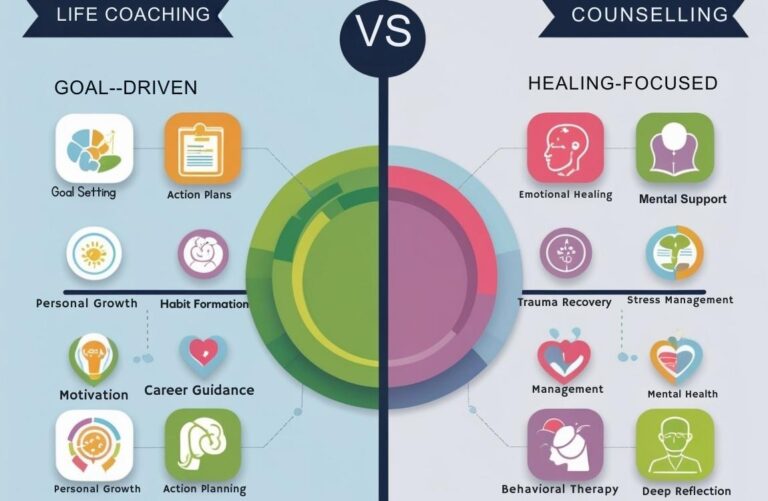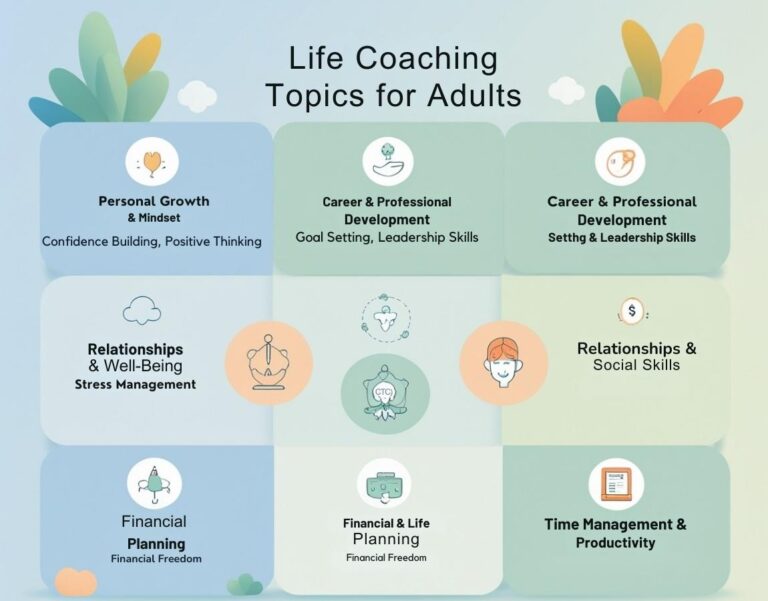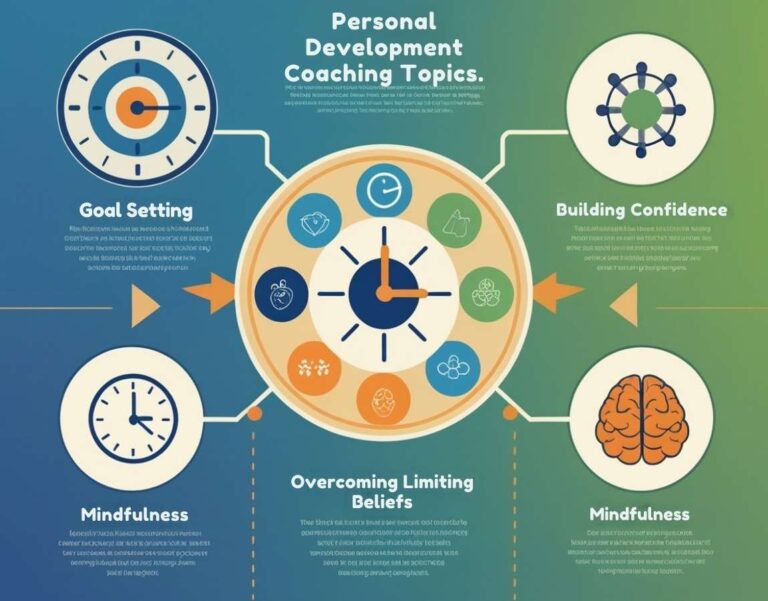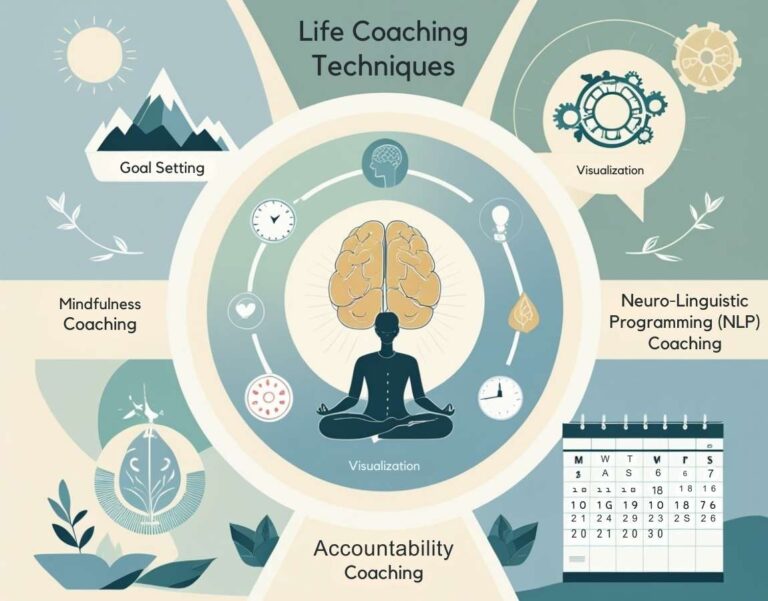Life coaching comes in many forms. Different people need different approaches. That’s why there are so many types of life coaching techniques. Some focus on goals. Others help shift your mindset. But how do you know which one fits you?
As a life coach, I’ve seen this up close. Some people need structure. Others need a softer touch. Knowing how different coaching techniques work can help you find what clicks.
In this post, we’ll explore popular life coaching methods, the science behind effective coaching techniques, and how to pick the right one for you. Let’s get started!
Understanding Life Coaching Techniques
Life coaching is about real change. The right method can help you grow, set goals, and feel more confident. But what are life coaching techniques, and why do they matter?
A coaching technique is a way to guide personal growth. Some focus on mindset shifts. Others use step-by-step actions. The key is finding what fits you best.
Think of life coaching like working out. Some people love high-energy training. Others need a slower pace. Different coaching methods solve different problems—like stress, self-doubt, or career struggles.
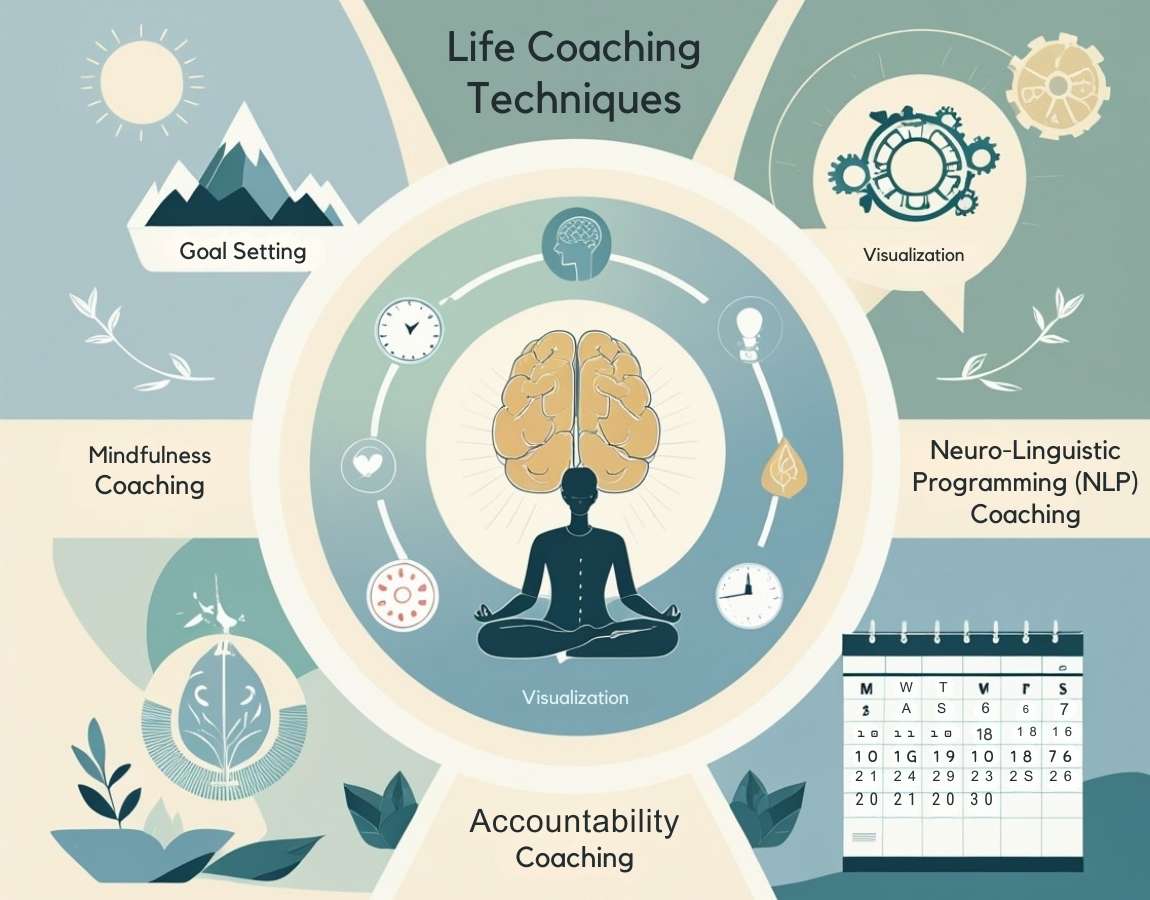
For example, Cognitive Behavioral Coaching (CBC) helps you change negative thoughts. Solution-Focused Coaching gets you to take action fast. Each method has a purpose, just like different exercises build different muscles.
No single technique works for all. That’s why it’s good to explore. In the next section, we’ll look at popular life coaching methods so you can find what works for you.
Popular Life Coaching Methods
Life coaching comes in many styles. Some focus on changing thoughts. Others help you take action fast. Let’s explore some top coaching methods and how they work.
Cognitive Behavioral Coaching (CBC)
CBC helps you change negative thoughts. It’s like retraining your brain to focus on facts, not fears.
If you struggle with self-doubt, CBC gives you tools to think more clearly. It’s great for boosting confidence and reducing stress.
Neuro-Linguistic Programming (NLP) Coaching
NLP is about how words shape your mind. It helps you shift your mindset and improve communication.
Let’s say you fear public speaking. NLP reframes your thoughts so you feel calm and in control. It’s great for building confidence.
Transformational Coaching
This method helps you rediscover yourself. It’s for those seeking big life changes.
If you feel stuck, transformational coaching helps you find clarity and purpose. It’s ideal for career shifts or personal growth.
Solution-Focused Coaching
This method gets results fast. Instead of analyzing problems, it helps you find solutions now.
If you feel unmotivated, a coach will ask, “What’s one small step forward?” This approach is great for setting goals and making quick progress.
Performance Coaching
Want to level up in work or life? Performance coaching helps you reach peak performance.
It’s often used by athletes, executives, and entrepreneurs to improve focus, habits, and productivity.
Mindfulness-Based Coaching
Feeling overwhelmed? Mindfulness coaching helps you slow down, breathe, and focus on the present.
It uses meditation and deep breathing to help with stress and emotional balance.
Holistic Coaching
Holistic coaching looks at the whole picture—mind, body, and spirit.
It’s great for balancing mental and physical health. If you want a well-rounded, healthy life, this might be for you.
Each method has a purpose. Some help you think better. Others push you to take action. The right one depends on your goals.
Next, we’ll explore how these methods work in real life and how to pick the best one for you!
How Different Coaching Techniques Work
Not all coaching styles are the same. Some coaches tell you what to do (directive). Others help you find your own answers (non-directive). Both work, but in different ways.
Directive vs. Non-Directive Coaching
Directive coaching is more structured. The coach gives guidance, advice, and clear steps to follow. It’s great if you want quick results and a clear plan.
For example, in performance coaching, an executive coach might say:
“Try this strategy to improve productivity. Track your progress daily.”
Non-directive coaching is different. The coach asks powerful questions to help you discover your own solutions.
In transformational coaching, the coach might ask:
“What does success look like for you? What’s holding you back?”
Instead of giving advice, they help you dig deep and find your own path.
The Role of Listening, Questions, and Accountability
Good coaching isn’t just talking—it’s active listening. A great coach hears what you say and what you don’t say. They ask questions that make you think.
Let’s say you want to switch careers but feel stuck. A coach might ask:
“If fear wasn’t a factor, what would you do?”
That question shifts your focus from fear to possibility.
But coaching isn’t just about insights—it’s also about accountability. A coach makes sure you follow through. They help you set goals and stick to them.
Real-Life Coaching in Action
Imagine this: You’re an athlete stuck in a performance slump. A mindfulness-based coach teaches you to stay present. Instead of worrying about the last game, you focus on this moment.
Or maybe you feel lost in life. A holistic coach looks at your whole well-being—mind, body, and emotions—to help you find balance.
Each coaching technique has its place. Some give clear steps. Others help you explore. The key is finding what works best for you.
Choosing the Right Coaching Technique for You
Choosing the right coaching method can be tricky. But don’t worry, it’s like picking a workout. Some people need structure. Others need freedom. The goal is to find what works best for you.
What Do You Want to Change?
Start by thinking about your goals. Are you looking to boost your confidence? If so, NLP coaching might be a good fit. Struggling with negative thoughts? Try Cognitive Behavioral Coaching (CBC). If you’re ready for a major change, transformational or holistic coaching might be right.
Quick Tip: Your coaching style should match your goals. If you want quick results, try solution-focused coaching. If you want deep change, go for transformational coaching.
What Coaching Style Fits You?
Think about how you learn best. Do you need clear steps? A directive coach will guide you with advice and steps. Do you like exploring your own answers? A non-directive coach will ask questions to help you think it through.
I remember when I first started coaching. I needed clear action steps. But I’ve worked with clients who prefer a more open, reflective approach. Knowing your learning style is key.
Quick Tip: If you want clear guidance, go for a directive coach. If you like to reflect and explore, choose a non-directive coach.
Try Before You Commit
Many coaches offer free discovery calls. Take advantage of them! It’s like trying on clothes. You’ll get a feel for the coach and their style.
I once had a client who tried performance coaching but quickly realized she needed mindfulness-based coaching instead. After one session, she knew it was the right choice.
Quick Tip: Book a free consultation to see if the coach feels right for you.
Trust Your Gut
At the end of the day, it’s all about what feels right for you. If a coaching style doesn’t click, that’s okay! Don’t be afraid to try another approach. Coaching is about growth, and growth sometimes means trying different methods.
So, what feels right for you? Do you need structure? Do you need to shift your mindset? Or do you need a deep transformation? There’s a coaching method that fits your needs.
Next, we’ll dive into why these coaching methods actually work, backed by science!
The Science Behind Effective Coaching Techniques
Ever wonder why coaching works? It’s not just feel-good talk—it’s backed by science. If you want to shift your mindset, break bad habits, or reach your goals, coaching uses real brain science to help. Let’s dive in.
How Coaching Changes Your Brain
Coaching helps rewire your brain. This is called neuroplasticity—your brain’s ability to change and grow. When you replace bad habits with good ones, your brain builds new pathways.
Think of it like upgrading your phone’s software. Old habits (negative thinking, fear, procrastination) get replaced with better ones (confidence, action, success).
For example, Cognitive Behavioral Coaching (CBC) helps you swap negative thoughts for positive ones. Studies show this boosts problem-solving skills and lowers stress.
Why Small Wins Matter
Why do some people stick to goals while others quit? The answer is dopamine, your brain’s feel-good chemical. When you achieve even a small goal, your brain rewards you with a dopamine hit. This makes you want to keep going.
Coaches use this by helping you set small, easy goals. Every win keeps you moving forward.
For example, Solution-Focused Coaching helps you act fast instead of overthinking. Quick wins build momentum and motivation.
The Power of Accountability
Let’s be real—staying on track is hard. That’s where accountability comes in. Research shows people are 95% more likely to reach goals when they check in with someone.
Coaching gives built-in accountability. Whether it’s weekly calls, tracking progress, or self-reflection, having someone to answer to keeps you going. Performance coaching, for example, uses structured feedback to push you forward.
Proof That Coaching Works
Coaching isn’t just a trend—it’s proven by research.
A Journal of Positive Psychology study found that coaching boosts resilience and well-being.
Science shows mindfulness coaching lowers stress by reducing cortisol (your stress hormone) and improving focus.
Companies using executive coaching see a 500-700% return on investment due to better performance.
Why Coaching Needs Structure
Random advice doesn’t work. Structured coaching does. Why? Because it follows a proven process that sticks.
For example:
Neuro-Linguistic Programming (NLP) Coaching changes negative beliefs by using words and visualization.
Transformational Coaching helps you rediscover yourself and make deep changes.
Holistic Coaching balances your mind, body, and emotions for full growth.
Each method follows a system that leads to real, lasting change.
FAQs
What is the best life coaching technique?
It depends on your needs. CBC helps with negative thoughts. Solution-focused coaching is great for quick results. Pick what fits your goals.
How do I choose the right coaching method?
Think about your goals. NLP improves confidence. Performance Coaching boosts productivity. Try different styles to see what works for you.
Can I mix different coaching techniques?
Yes! Many people do. Mindfulness Coaching pairs well with Holistic Coaching for stress relief. Combining methods can improve results.
How long before I see results from coaching?
It varies. Some notice changes in weeks, especially with Solution-Focused Coaching. Others, like Transformational Coaching, take months.
Does life coaching work for everyone?
Most people benefit, but success depends on effort. If one method doesn’t help, try another. There’s always a style that fits your needs.
More info for you
What to Expect from a Life Coach
What can life coaches help with
Last Word
Life coaching gives you many ways to grow. Each method helps in a different way. Some help you change your thoughts. Others help you take action. The key is finding what works for you. Try different styles and see what feels right. Coaching is like a workout for your mind. Some need a fast pace. Others need a slow and steady approach. Trust yourself. The right coach and method will help you move forward. Keep learning, keep growing, and don’t be afraid to try new things. Your best self is waiting!

